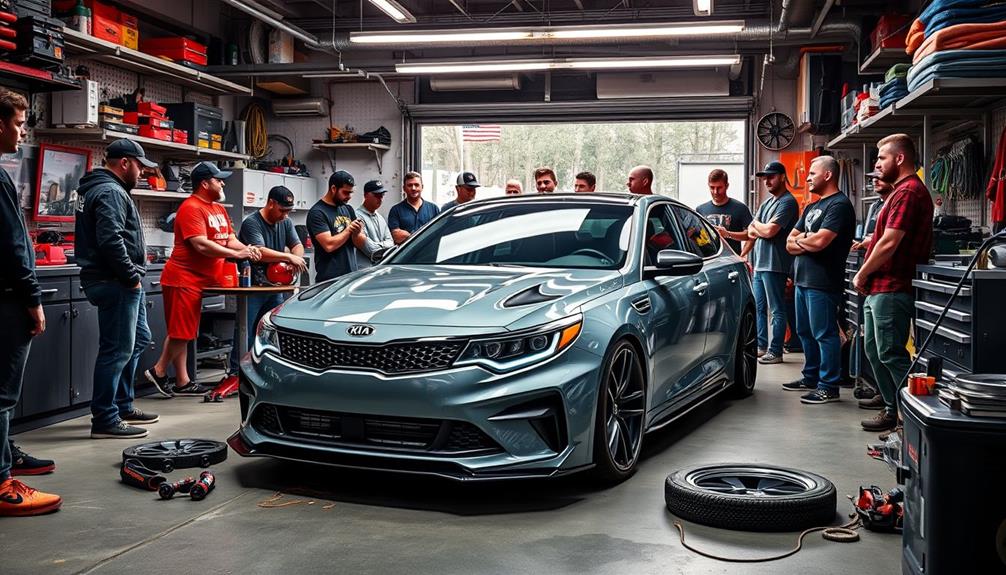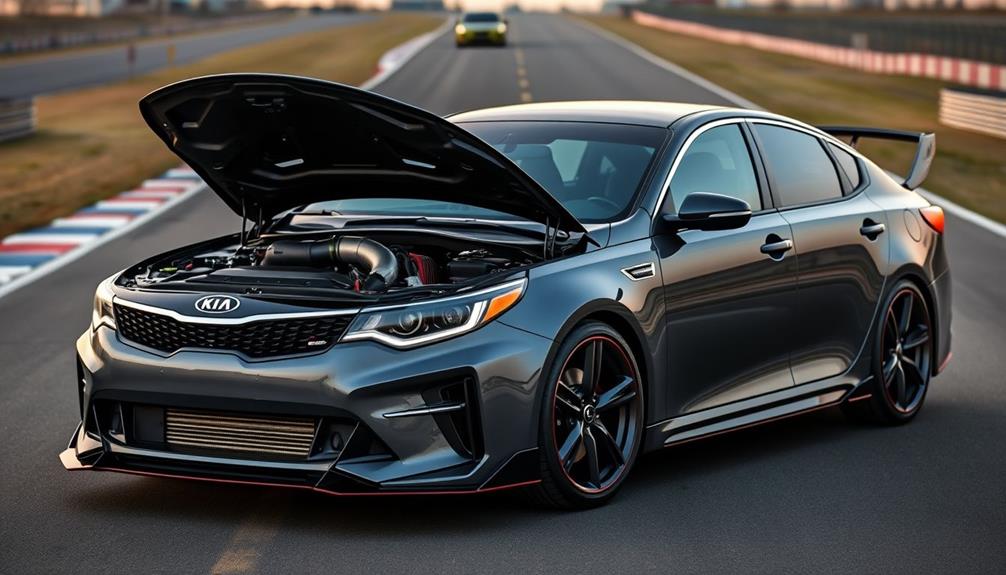Tuning your Kia Optima can turn your everyday sedan into a powerful performance machine. Options like the SFR ECU Flash can give you up to 100whp, while the LAP3 Tune boosts your horsepower without any modifications. Some tunes require specific hardware, like spark plugs and an upgraded intake system, to maximize gains. Many enthusiasts praise the ease of installation and performance improvements these tunes provide. Don't forget to maintain your vehicle with regular upkeep and high-octane fuel for peak efficiency. There's plenty more to discover about enhancing your Optima's performance, so let's explore further!
Key Takeaways
- Various tuning options like LAP3 and SFR ECU Flash can increase horsepower by 20-100whp for Kia Optima models.
- Supporting modifications, such as upgraded exhausts and intakes, are essential for maximizing performance gains.
- Regular maintenance and high-octane fuel (91 or 93) are crucial for ensuring engine health and longevity after tuning.
- Community forums provide valuable insights and shared experiences for Optima enthusiasts seeking performance enhancements.
- Reliability concerns exist with aggressive tunes like BTRcc, emphasizing the need for careful consideration of engine health.
Tuning Options and Performance Gains
When it comes to tuning your Kia Optima, you've got multiple options that can greatly boost your vehicle's performance. Each tuning option offers unique performance gains, catering to different needs and budgets.
The LAP3 Uncle Chip Performance Tune is a popular choice, providing 20-50whp gains for just $549.95, and it doesn't require any additional modifications for 2011-2015 Kia Optima and Hyundai Sonata 2.0T models.
If you're seeking more power, consider the SFR ECU Flash, which costs between $400-450 and can yield 35-100whp gains. With full bolt-ons and a custom tune, you might even hit 300whp!
Another option is the UTUNE Performance Flash, priced at $649.95, which offers around 40whp gains using 91 octane fuel.
For those willing to invest more, the BTRcc Reflash Module claims gains of 50-80whp for $750, though it requires specific hardware modifications.
Finally, the Racing Cube Custom Tune is available for $700 and can yield around 80whp gains, but it necessitates exhaust and intake modifications.
Choose the tuning option that best suits your performance goals and budget!
Installation Requirements and Compatibility

Several tuning options for the Kia Optima come with specific installation requirements and compatibility considerations.
If you own a 2011-2015 Kia Optima (2.0T), the LAP3 Tune is a straightforward choice, requiring no additional modifications.
The SFR ECU Flash suits any year 2.0T/2.4 Optima, also needing no modifications for the base tune, but it supports water methanol tuning for those seeking extra power.
For 2011-2012 models, the UTUNE Flash is compatible and doesn't require modifications, though using higher octane fuel is recommended for peak performance.
However, if you're interested in the BTRcc Reflash Module for 2011+ 2.0T/2.4 models, you'll need specific hardware modifications, like HKS M45XL spark plugs and an oil catch can.
Lastly, the Racing Cube Tune fits 2011+ 2.0T/2.4 owners but comes with stricter installation requirements.
You'll need to install an exhaust, intake, performance spark plugs, and a blow-off valve (BOV) for best results.
Always check compatibility before diving into the installation process to verify your chosen turbo kit works seamlessly with your vehicle.
User Feedback and Community Insights

When tuning your Kia Optima, user feedback plays a vital role in understanding performance improvements and reliability concerns.
Many enthusiasts highlight the balance between enhanced power and engine longevity, stressing the importance of maintenance.
Engaging with the community can provide valuable insights and help you make informed decisions about your tuning options.
Performance Improvements Reported
Over the past few years, Kia Optima enthusiasts have reported impressive performance improvements after tuning their vehicles. Many users have experienced gains of 20-100whp, depending on the tuning option chosen. Options like the LAP3 Uncle Chip and SFR ECU Flash have become popular for their effectiveness.
Community feedback highlights the reliability and ease of use of the U-Tune, which delivers around 40whp gains without requiring additional modifications.
On Optima Forums, enthusiasts discuss the aggressive nature of the BTRcc reflash. While some express concerns about potential reliability issues, they still appreciate the significant performance boost of 50-80whp. This shows a clear trend: when you invest in a custom tune, you can reveal your Optima's true potential.
Many users stress the importance of pairing these custom tunes with proper supporting modifications, such as upgraded exhaust and intake systems, to maximize performance improvements.
The ongoing anticipation for new tuning options from companies like SFR and updates from U-Tune reflects a vibrant community keen to balance enhanced performance with everyday drivability. Embracing these tuning options can truly transform your Kia Optima into a performance powerhouse.
Reliability Concerns Discussed
Reliability concerns are a hot topic among Kia Optima enthusiasts, especially regarding aggressive tuning options like the BTRcc Reflash Module. Many users have raised alarms about potential reliability issues when pushing their vehicles to the limit, particularly for track performance.
On the Optima Forums, which boast over 523.1K posts, members frequently share their experiences, highlighting the delicate balance between performance improvements and maintaining engine health.
While some tuning options, like the LAP3 tune, receive praise for enhancing performance without jeopardizing reliability, regular maintenance is emphasized as vital for keeping your engine in top shape.
In contrast, the U-Tune garners favor for its reliability and user-friendly setup, with numerous users reporting significant performance improvements after installation.
To mitigate reliability issues associated with tuning, enthusiasts recommend using upgraded spark plugs, such as HKS M45XL. These components can help secure engine longevity and performance stability, allowing you to enjoy the benefits of tuning without compromising reliability.
Ultimately, it's important to weigh your tuning choices carefully and stay informed through community insights to make the best decisions for your Kia Optima.
Community Engagement Importance
Community engagement plays an essential role in the Kia Optima tuning scene, as it allows enthusiasts to learn from one another's experiences and insights.
With forums like the Optima Forums, which boasts over 523,000 posts and 44,000 members, you can tap into a treasure trove of information. Here, users share their tuning options, performance improvements, and the reliability of various modifications, helping you make informed decisions.
Positive feedback on the UTUNE flash, for instance, illustrates how community recommendations can guide you toward reliable tuning solutions.
Discussions about BTR's aggressive tuning approach highlight the community's collective wisdom, addressing potential reliability concerns and sharing real-world track performance experiences.
Future Trends in Tuning

The future of Kia Optima tuning looks promising, with a surge in interest as enthusiasts seek to balance performance and reliability in their daily drivers.
As tuning options expand, you'll find innovative solutions from companies like SFR and updates from U-Tune, making it easier than ever to enhance your sedan's capabilities.
One of the key trends is the integration of advanced technologies, such as self-compensating tunes that adapt to your modifications. This will allow you to achieve better throttle response while maintaining engine health.
High-performance packages are also on the rise, featuring components like methanol injection and upgraded wastegates, pushing horsepower to impressive levels of 330-345 wheel horsepower.
As you explore these options, the community's focus on dependable performance enhancements will guide your choices.
You'll want to pay attention to fuel quality, with recommendations like 93 octane for best results when using advanced tunes like KSR.
With aftermarket modifications becoming more accessible, prioritizing tunes that support a range of upgrades will help you maximize your Kia Optima's potential while keeping reliability in check.
Maintenance and Upgrade Considerations

When you're tuning your Kia Optima, prioritizing maintenance is essential to guarantee peak performance and longevity.
Regular upkeep helps your upgrades shine and keeps your engine running smoothly. Here are some key considerations you shouldn't overlook:
- Install Dual Oil Catch Cans: This enhances engine health by reducing oil vapor buildup and keeps your system cleaner.
- Monitor Spark Plugs: Regularly check the condition of your plugs. Upgraded HKS M45XL spark plugs are recommended for specific tunes like the BTRcc, while stock plugs may work for others.
- Fuel Quality Matters: Consistently use higher octane fuel, like 91 or 93, to maximize tuning gains and protect your engine.
- Consider Performance Upgrades: Installing a K&N Typhoon intake system and a CX Racing front-mounted intercooler can greatly improve airflow and cooling, boosting overall performance.
KSR Tune Overview

If you're looking to greatly boost your Kia Optima's performance, the KSR tune is a compelling option. This tuning solution takes your factory horsepower from a range of 225-245 to an impressive 310 wheel horsepower, delivering a significant performance increase. Priced at $600, the KSR tune also offers an optional pop and gurgle feature for an extra $50, adding an exciting auditory flair to your driving experience.
The KSR tune enhances various aspects of your vehicle's performance, including boost response, throttle response, and air-fuel ratios (AFR). It opens up higher rev limits, surpassing factory settings of 4,000 RPM, and eliminates RPM restrictions found in the factory setup. This means you can maximize your Kia Optima's potential without worrying about limitations.
Additionally, the KSR tune features self-compensation for future modifications, ensuring that your vehicle continues to perform at its best as you make further upgrades.
To get the best results, it's recommended to use 93 octane fuel, but if that's unavailable, a mix of 91 and E85 will suffice. With the KSR tune, your Kia Optima can truly transform into a performance powerhouse.
Engine Modifications and Enhancements

When you're ready to boost your Kia Optima's performance, consider a range of engine upgrades that can make a noticeable difference.
From tuning options to effective fuel management strategies, each modification plays an essential role in enhancing your ride.
Let's explore the best recommendations that can take your engine to the next level.
Recommended Engine Upgrades
Regularly upgrading your Kia Optima's engine can lead to noteworthy performance gains and a more thrilling driving experience.
Focus on these key enhancements to transform your sedan into a performance powerhouse:
- K&N Typhoon Intake System: This upgrade enhances airflow, improving throttle response and overall engine performance for around $350.
- Larger Turbo and Wastegate Upgrade: Boosting horsepower considerably, this combo can help you reach an impressive 330-345 wheel horsepower with proper tuning.
- Methanol Injection: A game-changer for performance, it allows for higher horsepower and better air-fuel ratios (AFR), supporting that peak power output.
- Oil Cooler: Installing an oil cooler helps maintain ideal engine temperatures during high-performance driving, guaranteeing longevity and reliability.
Additionally, consider performance spark plugs, like the HKS M45XL, which are essential for specific tunes such as the LAP3.
These spark plugs provide reliable performance and contribute to engine health when making modifications.
With these upgrades, you'll not only enjoy enhanced performance but also a more exhilarating driving experience in your Kia Optima.
Tuning Options Comparison
Upgrading your Kia Optima's engine is just the beginning; the right tuning options can further elevate your vehicle's performance. Among the standout choices, the KSR tune delivers an impressive performance boost, achieving around 310 wheel horsepower for $600.
This option outshines competitors like the LAP3 Uncle Chip Performance Tune, which offers a gain of 20-50 whp without needing additional modifications, priced at $549.95.
For those craving even more power, consider methanol injection, which can push your output to between 330-345 wheel horsepower. Wastegate upgrades and larger turbo options can also enhance your engine's capabilities considerably.
The SFR ECU Flash is another solid choice, providing gains of 35-100 whp for any 2.0T/2.4 Kia Optima model, potentially reaching 300 whp when paired with full bolt-ons and a custom tune, costing between $400-750.
To make the most of these tuning options, regular maintenance is essential. Keep in mind that some tunes might require specific hardware like upgraded spark plugs and oil catch cans to maximize performance and reliability.
Fuel Management Strategies
Fuel management strategies play an essential role in maximizing the performance of your Kia Optima, especially after engine modifications. To truly harness the power of your upgrades, you need to focus on several key aspects:
- Fuel Quality: Use 93 octane fuel or a mix of 91 octane and E85 for peak performance.
- Methanol Injection: Consider this upgrade to potentially boost your horsepower to 330-345 wheel horsepower while improving fuel efficiency.
- Regular Refueling: Keep your tank above 30 miles to prevent engine damage and maintain consistent performance.
- Intake Upgrades: Improve air-fuel ratios (AFR) with better intake systems like the K&N Typhoon, which can enhance combustion efficiency.
Additionally, adjusting your ignition timing can further enhance performance.
By monitoring fuel quality and ensuring proper fuel ratios, you'll maintain engine health and performance.
Remember, variations in air quality and temperature can impact your fuel management strategies, so stay proactive about your tuning.
With these strategies in place, you'll transform your Kia Optima into a true performance powerhouse.
Fuel Management Strategies

When aiming for ideal performance in your Kia Optima, choosing the right fuel management strategies is vital. The fuel quality you select has a direct impact on your vehicle's performance. For best results, especially with tunes like the KSR tune, it's recommended to use 93 octane fuel. This choice greatly enhances power delivery compared to 91 octane. If you can't access 93 octane, try mixing 7 gallons of 91 octane with 2 gallons of E85 for improved performance.
Maintaining consistent refueling habits is important. Refueling when you have around 30 miles left can help prevent fuel pump damage and extend engine longevity. Additionally, implementing methanol injection can further boost fuel efficiency and power delivery.
Here's a quick overview of your options:
| Fuel Type | Benefits |
|---|---|
| 93 Octane | Best power delivery |
| 91 Octane + E85 | Good alternative for performance |
| Methanol Injection | Enhanced fuel efficiency |
Community Engagement and Merchandise

Building a strong connection with fellow Kia enthusiasts can enhance your tuning experience considerably. By actively engaging in community discussions, you not only learn from others but also share your insights, fostering a sense of belonging.
The Optima Forums, with over 523.1K posts and 44.4K members, serve as a hub for exchanging tuning experiences and recommendations. Additionally, understanding your budget can play a vital role in making informed tuning decisions, allowing you to invest wisely in modifications and upgrades that enhance performance and maintain reliability.
This knowledge can help you avoid common financial mistakes, such as failing to invest early, which could lead to missed opportunities for optimizing your vehicle.
Here's how community engagement elevates your tuning journey:
- Gain valuable feedback on balancing performance and reliability.
- Discover various tuning options and their impacts on daily driving.
- Participate in discussions about different tuning products and modifications.
- Enjoy exclusive merchandise drops and giveaways, enhancing community spirit.
Merchandise initiatives, like the KDM Mafia Race Team's collaboration offerings, strengthen these connections. Priced at $50 with free shipping options, these items not only showcase your passion but also support the community.
Limited edition drops and giveaways, featuring shirts and stickers, encourage participation and offer entry into exciting promotional events. By embracing community engagement and exploring merchandise, you'll enrich your Kia Optima tuning experience, making it even more rewarding and enjoyable.
Frequently Asked Questions
What Is the Average Cost of Kia Optima Tuning?
The average cost of tuning a Kia Optima typically ranges from $500 to $2,000. Factors like the type of modifications, labor costs, and parts you choose can affect the final price considerably.
Will Tuning Void My Kia Optima Warranty?
About 70% of car owners worry tuning might void their warranty. It often depends on your dealer's policies and whether the modification directly causes damage. Always check your warranty terms before making any changes.
Can I Tune My Optima Myself?
Yes, you can tune your Optima yourself if you're comfortable with car modifications. Just make sure you have the right tools and software. Remember, though, it might affect your warranty and vehicle reliability.
How Does Tuning Affect Fuel Efficiency?
When you tune your car, like adjusting the air-fuel ratio, you can enhance fuel efficiency. Improved combustion can lead to better mileage, so you might find yourself making fewer trips to the gas station.
Are There Any Risks Associated With Kia Optima Tuning?
Yes, there are risks with tuning your Kia Optima. You might experience engine stress, reduced reliability, or voided warranties. It's essential to weigh these factors against the potential performance gains before making any modifications.
Conclusion
As you begin your tuning journey, think of your Kia Optima as a canvas, waiting for your brushstrokes of performance to bring it to life. Each modification is a note in a symphony, harmonizing power and efficiency. Embrace the community, share your insights, and watch your sedan transform into a masterpiece of engineering. Remember, every journey starts with a single step; let your passion drive you forward, and soon you'll be cruising at the forefront of performance innovation.









